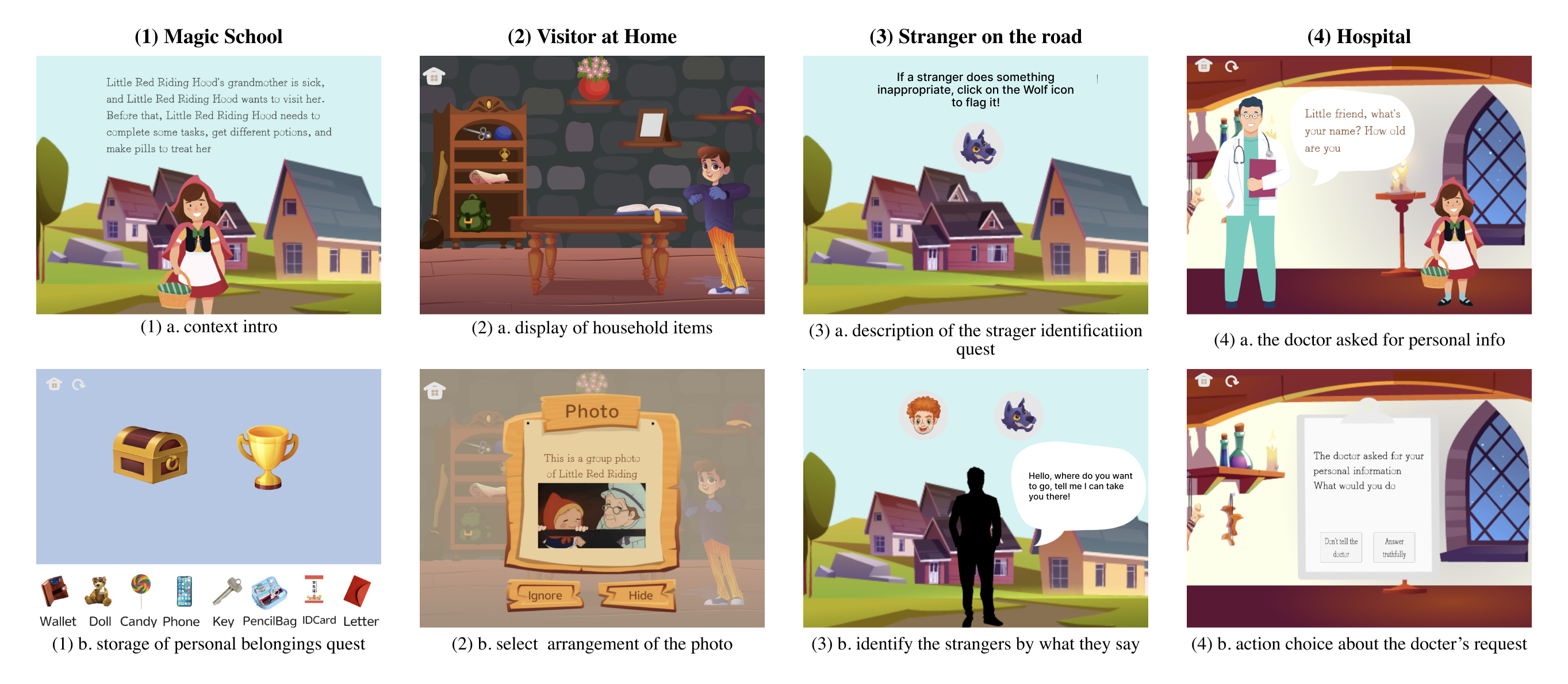RedCapes.
Design and Evaluation of a Game Towards Improving Autistic Children's Privacy Awareness.
Children with autism spectrum disorder (ASD) have differences in social communication, making them vulnerable to privacy risks in social contexts. Research on typically development (TD) children's privacy learning often neglects autistic children's special needs. Therefore, our study aims to understand their challenges in learning privacy and design an effective privacy education game for them. We designed a serious game, RedCapes, and recruited 9 children with ASD and 6 TD children to evaluate the game. Our findings suggested that RedCapes improved autistic children's privacy awareness. Compared to TD children, children with ASD have more difficulty in discerning risks and generalizing privacy norms.

Context
In our prior study, we first conducted semi-structured interviews with 14 parents of children with ASD to understand how parents perceive and protect their children’s privacy and how they teach privacy concepts. We found that many parents believe privacy issues stem from a lack of perception of social norms. Children with ASD often struggle to adapt to different social contexts, which may result in the invasion of others’ privacy accidentally. Parents also think that their children lack the ability to analyze the potential benefits and costs associated with information disclosure.
Game Design
We had three objectives in designing this privacy education game. We want to teach them to: (1) understand the concept of personally identifiable information and personal belongings; (2) recognize privacy norms in different social contexts; (3) respond to privacy threats appropriately. We integrated two types of privacy concepts into our game: personal information and physical privacy. In each of our game scenes, players interact with different populations in different contexts: showing personal belongings to the staff at schools; putting away personal items at home when strangers drop by; responding to strangers’ questions in public; responding to a doctor’s requests in a hospital.

User Study
We conducted a three-part study to investigate the usability and effectiveness of our game. The game's usability was evaluated through observations of children playing the game and interviews with their parents. The game's effectiveness was determined by children’s improvements in privacy awareness tests before and after the game. To understand the unique privacy learning challenges children with ASD face, we conducted the study with children with ASD and TD children. We recruited 15 participants in total, 9 for the ASD group, and 6 for the TD group. Children with ASD were recruited from a special education school while TD children were recruited randomly through our lab's social media.

Results & Conclusion
We compared children with ASD and TD children's performances in the game and pre/post-game tasks and coded interviews with their parents. We organize our findings into the following categories: privacy learning challenges in RedCapes, children's learning outcomes, children's performances in the game, game design suggestions, parents' privacy teaching challenges, and privacy evaluation challenges. We found that children with ASD improved a lot after the game while TD children did not improve much. But children with ASD face more difficulties in articulating and internalizing privacy concepts, such as focusing on irrelevant details and missing when privacy disclosure is needed. These findings present opportunities for future privacy education game design and research.

Team Member
Xiaowen Yuan: Unity Developer & Game Designer
Ziheng Tang: Unity Developer & Data Analyst
Yaxing Yao: Supervisor (Co-PI)
Xin Tong: Supervisor (PI)
My Keywords
#Game Design
#Unity3D developer & C# programming
#Storytelling
